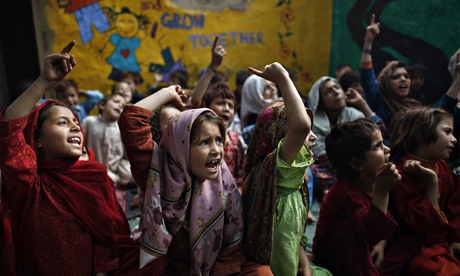This is not the first time the CII has condoned child marriage. In April, it ruled that banning such unions was anti-Islamic. While the ruling does not have any bearing on policymaking, it could have a major influence on local religious leaders nationwide.
But the CII’s controversial statements should not detract from the progress made on addressing child marriage in Pakistan. In fact, a new law that prevents under-18s, irrespective of gender, from getting married was passed unanimously by the provincial assembly in Sindh, raising hopes for the future for girls like Mehwish. The law also punishes those who facilitate, contract or perform such marriages with up to three years in jail and a fine of 45,000 rupees (£455).
Sindh has the highest rate of child marriage of any province in Pakistan. That such a law could pass in this region sets it out as a landmark piece of legislation. If the law is implemented in letter and spirit it will help to ensure girls’ rights to stay in school and marry later. It will help to secure their right to choose.
It is also my hope that the law will act as a deterrent against the customary practice known as vani or swara, where girls are given in marriage to compensate for the crimes of a male member of their family. The law also counters the religious misinterpretations that promote early marriage, as the CII recently put forward.
We want to see similar action across Pakistan. A bill has been introduced in the national assembly to strengthen punishment against perpetrators of child §marriage but has met with opposition from religious parties. We may yet see change in Punjab, however, where a bill that raises the legal age of marriage and toughens sanctions is under discussion.
Nationally there are glimmers of progress too. At the open working group on the sustainable development goals, a major intergovernmental process that will help shape the next set of international development goals, Pakistan proposed to end child, early and forced marriage by 2030. It is an ambitious vision, but it will not become a reality unless commitments turn into action.
Take the example of Mehwish, who was just eight when she got married. A primary school pupil from a small town in Punjab, central Pakistan, she had no understanding of the meaning of such things. She was taken out of school shortly after her wedding day.
But Mehwish was determined to get an education. After years of pleading with her husband to let her enrol again, she was finally allowed to return to the classroom – or so she thought. The education authorities would not let her back in: married girls, they said, would ruin the environment for the other students.
Mehwish’s story is not uncommon. In Pakistan, one in four girls is married before her 18th birthday, forced into adulthood while she is still a child. Early marriage often spells an abrupt end to a girl’s education too.
Every child needs to know the impact of early marriage and their right to say no. We need a national awareness campaign to make sure that families are aware that such unions are illegal. The Child Marriage Restraint Act states that no individual under 16 should be wed, but many families in rural areas are unaware of this fact.
Families do not always understand the significance of having a national ID card and they often lack access to local government services to register their children at birth. The absence of such crucial information makes it difficult to verify the age of the bride and groom on their wedding day.
Preventing child marriage is virtually impossible without a fully functional birth registration system and systematic age checks before marriage ceremonies. This requires Pakistan to invest in developing a local government network that is operational and fully equipped to provide critically needed services across the country.
We also need to ensure that every child has access to education. When girls have safe, quality and accessible schooling, their parents are more likely to choose education over marriage.And the benefits are clear: just one extra year of secondary schooling alone boosts girls’ earning potential by 15-25%, helping to break the cycle of poverty. And when mothers have at least seven years of education, their children are less likely to die before their first birthday (pdf).
The future for girls in Pakistan can be bright if the government backs up its recent outspokenness on ending child marriage with action. We need strong laws that make marriage before 18 illegal and a comprehensive plan to make this a reality. Anything short of this will simply be lip service.
Mohammad Zia-ur-Rahman is the founder and chief executive of the Awaz Foundation Pakistan, a partner of Girls Not Brides, a global partnership to end child marriage

